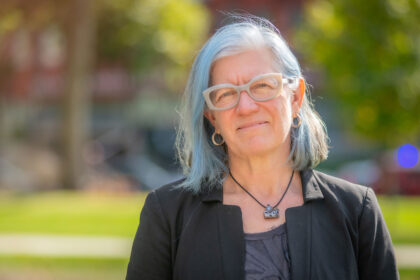Can migrants help shape sustainable cities?

Most policymakers focus on migration and sustainability as separate issues, missing key opportunities to implement transformational change in their cities, according to an article co-authored by a Clark anthropologist and published this week in the Proceedings of the National Academy of Sciences (PNAS).
“There is widespread discussion of both sustainability and migration as global political challenges of the 21st century, but there is little understanding of how they are related and, consequently, how they can be addressed together in a cohesive action,” Anita Fábos, a professor in Clark’s Sustainability and Social Justice Department, and her peers write in “Bridging and Breaking Silos: Transformational Governance of the Migration-Sustainability Nexus.” “Migration is thought of as external to sustainability concerns and migrants are left out of national and urban sustainability planning.”
From December 2020 to November 2021, the researchers interviewed 73 representatives involved in migration and sustainability efforts through governmental and non-governmental organizations in Worcester and three cities in Europe: Amsterdam, Brussels, and Malmö, Sweden. They discovered that the officials “find it challenging to see how they could be working together and that migrants are rarely conceived of as sustainability actors and/or targeted populations of sustainability policy.”
“There is widespread discussion of both sustainability and migration as global political challenges of the 21st century, but there is little understanding of how they are related and, consequently, how they can be addressed together in a cohesive action.”
— Anita Fábos et al
Proceedings of the National Academy of Sciences
This lack of collaboration stems, in large part, from a “silo approach” in “rigid, fixed governance institutions that rely on vertical organizational structures at the expense of horizontal coordination,” the authors note. They hope their research “may help stimulate new, more integrative and inclusive conversations among [those] who have an interest and an influence at the migration-sustainability nexus.”
These conversations are taking on even more urgency, they add, “with the impacts of climate change expected to drive more migration to urban areas.”
Worcester and Brussels won the authors’ attention for policy solutions that favor the integration of migrants into communities instead of encouraging complete assimilation, which often leads to newcomers’ dropping their language and cultural traditions. As an example, the researchers pointed to a Massachusetts state climate statute that recognizes “environmental justice communities,” allowing “local policymakers to designate specific communities — including those with high percentages of migrants — for state and national programs toward a green transformation.”

Twenty-one percent of Worcester’s 200,000 residents were born outside of the United States, with the largest migrant groups more recently coming from Ghana, the Dominican Republic, Brazil, and Albania, according to Fábos.
A number of factors affecting migrants “have negative implications for social cohesion and, in turn, for healthy and sustainable societies,” she explained at a World Health Summit meeting of experts addressing migrant and refugee health.
During the pandemic, these factors — health disparities, decreased mobility due to travel restrictions and cutbacks in public transportation, and lack of green space in the high-density neighborhoods where most migrants live — all contributed to their increased stress and mental health issues, she said.
Opportunities for mobility allow migrants to “remain connected to their supportive social networks, access health services, and be included as members of local communities,” Fábos explained during the World Health Summit presentation. “Cities that include an understanding of the health aspects of mobility in their planning toward health and sustainability may be better off in addressing climate change adaptation.”
Fábos’ research on migration, transformation, and sustainability has been funded by a two-year National Science Foundation grant as part of the Belmont Forum, a partnership of funding organizations, international science councils, and regional consortia committed to the advancement of transdisciplinary science. Her co-principal investigator on the grant has been Ed Carr, a professor in the Sustainability and Social Justice Department.
The two worked with peers from universities across the world on Project Misty: Migration, Transformation, Sustainability, which, according to researchers, aims to “support the emergence of a more empathetic and evidence-based approach to migration management in cities.”
In a 2019 article in The Lancet, Fábos and her peers argued that the migration of 750 million people worldwide “is a major driving force of planetary and population health” and that the United Nations’ Sustainable Development Goals “need to move beyond the implicit assumption that sedentary lives are the norm and that it is only safe, orderly, and regular migration that contributes to sustainable development. We suggest that, when migration is incorporated as an inherent and continuing part of social transformations, it will become central to long-term climate resilience and adaptation.”


